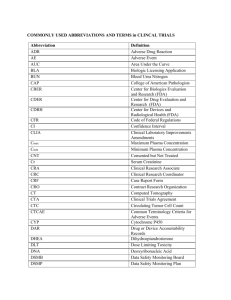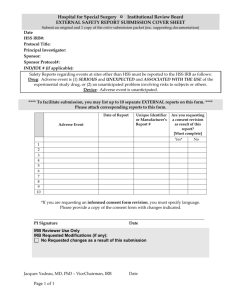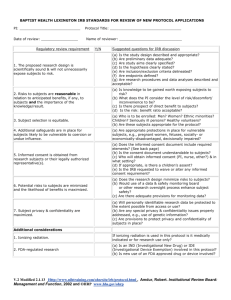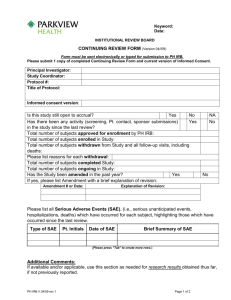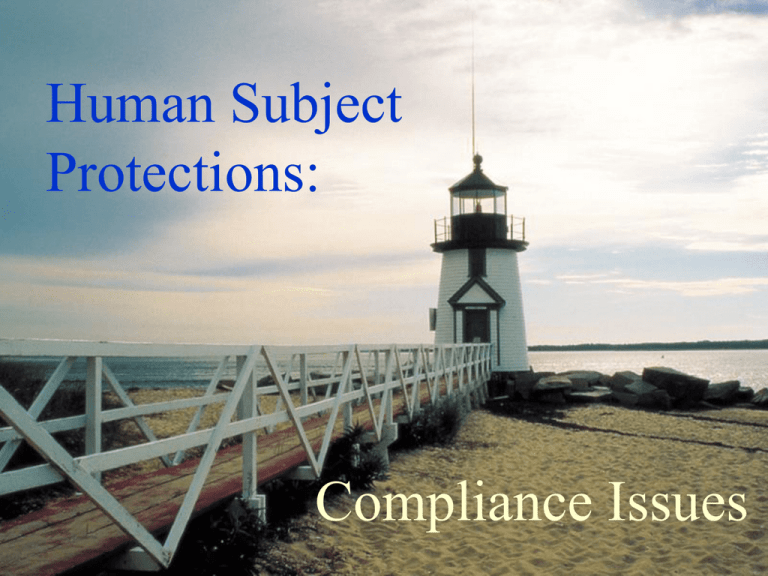
Human Subject
Protections:
Carleton College
October 10, 2002
Tom Puglisi, PhD
PwC
Compliance
Issues
The Protection of Human
Subjects in Research:
Compliance Issues
Pharmaceutical and Regulatory Congress
and Best Practices Forum
November 14, 2002
Tom Puglisi, PhD
PwC
©2001 PricewaterhouseCoopers. PricewaterhouseCoopers refers to the individual member firms of the world-wide PricewaterhouseCoopers organisation. All rights reserved.
Government Shutdowns
The Compliance Officer’s Nightmare !!
Massachusetts Eye and Ear
UCLA
VA Health Sys Greater Los Angeles
Rush Presbyterian St Luke’s Med Ctr
University of Illinois Chicago
Duke University Med Ctr
Univ Texas Medical Branch Galveston
University of Oklahoma Tulsa
Johns Hopkins University
PricewaterhouseCoopers
Definition of Research
“Research” means
•
•
A systematic investigation
Designed to develop or contribute to
generalizable knowledge
–
Research includes research development,
testing, evaluation, pilot studies
PricewaterhouseCoopers
Definition of Human Subject
Human subject means
•
A living individual about whom an
investigator…conducting research obtains
–
–
Data through intervention or interaction
with the individual,
or
Identifiable private information
PricewaterhouseCoopers
Definition of Human Subject
“Private Information” means
•
Information about behavior where an individual can
reasonably expect that no observation or recording
is taking place
or
•
Information that an individual can reasonably expect
will not be made public (e.g., a medical record)
PricewaterhouseCoopers
Federal Oversight of
Human Subject Research
• HHS Regulations
– Revised 1981, 1991
• Federal Policy for the
Protection of Human
Subjects (Common Rule)
– Adopted 1991
• FDA Regulations
– Revised 1981
PricewaterhouseCoopers
DHHS Regulations: 45 CFR Part 46
•
•
•
•
Subpart A = Core Protections
– IRB Review
– Informed Consent
Subpart B = Additional Protections for
– Pregnant Women, Fetuses, and Neonates
Subpart C = Additional Protections for
– Prisoners
Subpart D = Additional Protections for
– Children
PricewaterhouseCoopers
Enforcement of DHHS Regulations:
Office for Human Research Protections
•
Office for Human Research Protections (OHRP)
within Office of Public Health and Science (OPHS)
within Office of Secretary (OS) of HHS
– Education
– Compliance Oversight
– Administration of Assurances
http://ohrp.osophs.dhhs.gov/
PricewaterhouseCoopers
Federal Policy (Common Rule)
for the Protection of Human Subjects
•
•
•
•
17 Federal Agencies Adopted HHS Subpart A
Some Agencies Required Additional Protections
– VA => Compensation for Research - Related Injuries
Some Agencies Never Adopted the Federal Policy
– Department of Labor => Miners and Coal Dust
– Appalachian Regional Commission => Telemedicine
– Department of Transportation => Sleepy Truck Drivers
Only Voluntary Protections for Research Not Covered
Under HHS Regs, Common Rule, or FDA Regs
PricewaterhouseCoopers
Enforcement of Federal Policy
•
•
17 Federal Agencies Have Authority to Interpret the Policy
Human Subjects Research Subcommittee
Committee on Science
National Science and Technology Council
http:
//ohrp.osophs.dhhs.gov/references/humansubcomrost.htm
PricewaterhouseCoopers
Federal Policy (Common Rule):
The Assurance Process
• Every Institution “Engaged” in Human Subject Research
Supported by a Common Rule Agency Must Provide a
Written “Assurance” to Comply with the Federal Policy
• Directly to the Supporting Federal Agency
or
• To the HHS Office of Human Research Protections (OHRP)
PricewaterhouseCoopers
Federal Policy (Common Rule):
The Assurance Process
•
•
Common Rule Agency Assurances
– Single Project Assurance (SPA)
– Multiple Project Assurance (MPA)
OHRP Assurances
– Applicable Only to DHHS Research
=> SPA, CPA, NIA, AII
– Applicable to Common Rule Research
=> MPA, CA, IIA
=> Federalwide Assurance (FWA)
PricewaterhouseCoopers
Federal Policy (Common Rule):
OHRP Federalwide Assurance (FWA)
• Registration of IRBs (Regardless of Assurance Status)
• 3-Page Assurance Document Covers All Federal Research
–
–
–
–
–
–
Reference to Terms of Assurance on OHRP Website
Institution Name
Institutional Components
Reference to Ethical Principles
Designation of IRBs
Applicability (Optional Extension of HHS Regs or Common Rule to All
Institutional Research)
– Signatures of Responsible Officials
– Update as Changes Occur or Every 3 Years
PricewaterhouseCoopers
DHHS Multiple Project Assurance (MPA)
or Federalwide Assurance (FWA)
For Federally-Supported Research
• Common Rule Protections of HHS Subpart A
• IRB Review & Informed Consent
For HHS-Supported Research
• Protections of HHS Subparts A,B,C,D
MPA-FWA Institutions
• Voluntary application of Common Rule or all HHS Subparts to all
research, regardless of funding source
PricewaterhouseCoopers
Institutional Responsibility
for Protecting Human Subjects
• Institutional Commitment & Infrastructure
• Authorized Institutional Official
• IRB Chair, IRB Members, IRB Staff
• Other Institutional Committees
• Research Investigators and Co-Investigators
• Study Coordinators and Research Staff
• Everyone Else Involved in the Research Enterprise
PricewaterhouseCoopers
Roles and Responsibilities:
Authorized Institutional Official
• Legal Signatory for Institution (e.g. Assurance)
• Overall Organizational Responsibility
• Ensure Adequate Placement of IRB within
Institutional Structure
• Ensure Adequate resources for IRB (staff,
computers, office space, etc.)
• Inspire and Enforce Institutional Culture of
Respect and Compliance
• eg: Oversight and Monitoring of Research
PricewaterhouseCoopers
FDA Regulations
•
•
•
•
•
•
•
•
•
•
Informed Consent - 21 CFR 50
IRB Review - 21 CFR 56
Investigational Drugs - 21 CFR 31
Marketing Approval - 21 CFR 314
Biologics - 21 CFR 600
Biologics Licensing – 21 CFR 601
Investigational Devices - 21 CFR 812
Pre-Market Approval – 21 CFR 814
Financial Disclosure – 21 CFR 54
Electronic Records – 21 CFR 11
PricewaterhouseCoopers
FDA Regulations
Informed Consent -- 21 CFR 50
• Eight Required Elements
• Written Documentation
• Language Understandable to Subjects
• No Coercion or Undue Influence
• No Waiver of Subjects Rights
IRB Review -- 21 CFR 56
• Initial Review
• Prospective Review of All Changes
• Reporting/Review of Unanticipated Problems
• Reporting/Review of Adverse Events
• Continuing Review at Least Annually
PricewaterhouseCoopers
FDA Regulations
Drugs and Biologics
• Investigational New Drug Application (IND)
• 21 CFR Part 312
Devices
• Investigational Device Exemption (IDE)
• 21 CFR Part 812
PricewaterhouseCoopers
FDA Regulations:
Responsibilities of Investigators
• Ensuring Conduct of the Research per the
Investigator Agreement, Investigational Plan,
and All Applicable Regulations
• Protecting the Rights, Safety, and Welfare of
the Research Subjects
• Controlling access to and use of the test
article (drug/biologic/device)
• Monitoring and Reporting Adverse Events
• Maintaining and Retaining Accurate Records
PricewaterhouseCoopers
FDA Regulations:
Responsibilities of Sponsors
• Maintaining the IND
• Obtaining Qualified Investigators and
Monitors
• Providing Necessary Information / Training
for Investigators
• Monitoring the Investigation
• Reporting Significant Adverse Events to FDA
and to Investigators
• Maintaining and Retaining Accurate Records
PricewaterhouseCoopers
FDA Reporting Requirements:
Investigational New Drug Application (IND)
Adverse Event Reporting
• Investigator must report promptly (immediately if alarming) to the
Sponsor any adverse effect that may reasonably be regarded
as caused by the drug (21 CFR 312.64)
• Sponsor must notify FDA of any adverse experience associated
with the drug that is both serious and unexpected
– Serious Adverse Drug Experience = death, life-threatening,
hospitalization, persistent/significant disability/incapacity,
congenital anomaly / birth defect (21 CFR 312.32)
– Unexpected Drug Experience = any adverse drug experience, the
specificity or severity of which is not consistent with the current
investigator brochure or IND application (21 CFR 312.32)
PricewaterhouseCoopers
FDA Reporting Requirements:
Investigational Device Exemption (IDE)
Adverse Event Reporting
• Investigator must report any unanticipated adverse device
effect to Sponsor and the IRB as soon as possible and within
10 working days (Sec 812.150)
• Sponsor must report any unanticipated adverse device effect
to FDA, all reviewing IRBs, and investigators (Sec 812.150)
• Unanticipated Adverse Device Effect = any serious adverse
effect on health or safety, or any life-threatening problem or
death, caused by or associated with a device if not
previously identified in nature, severity, or degree of
incidence in the investigational plan or application (Sec 812.3)
PricewaterhouseCoopers
Requirements for Reporting to the IRB
• Required by HHS Human Subject Regs [46.103(b)(5)]
and FDA IRB Regs [21 CFR 56.108(b), 312.66]
– Unanticipated problems involving risks to subjects or
others
– Serious or continuing noncompliance with Regs or IRB
• Adverse Events (Required by FDA for devices only)
– Local IRB Policy Determines Requirements
– (i) Any serious adverse events experienced by subjects
– (ii) Any adverse events reported to the study sponsor
PricewaterhouseCoopers
FDA Regulation Exceptions and Exemptions:
Emergency Use of a Test Article
• Without Informed Consent -- 21 CFR 50.23(a)
– Life Threatening Situation Necessitating the Use
– Inability to Communicate with Subject for Legal Consent
– Insufficient Time to Obtain Consent from Legally Authorized
Representative (LAR)
– No Alternative Therapy Available
– Certification in Writing from Investigator and an other
Nonparticipating Physician of the Above
– Report to IRB Within 5 Working Days
• IRB Review -- 21 CFR 56.104 (c)
– Life Threatening Situation Necessitating the Use
– Report to IRB Within 5 Working Days
– Subsequent Use Requires IRB Review
PricewaterhouseCoopers
Enforcement of FDA Regulations
• Office of Good Clinical Practice
– Within Office of Science Coordination & Communication
– Within Office of Commissioner
http://www.fda.gov/oc/gcp
• Bioresearch Monitoring Program
– Within Office of Regulatory Affairs
• Center for Drug Evaluation and Research (CDER)
• Center for Biologics Evaluation and Research (CBER)
• Center for Devices and Radiologic Health (CDRH)
PricewaterhouseCoopers
Accreditation of Institutional
Human Research Protection Programs
• Mandatory Accreditation:
Department of Veterans Affairs
Medical Centers
– National Committee for
Quality Assurance (NCQA)
•
Voluntary Accreditation
– Association for the
Accreditation of Human
Research Protection
Programs (AAHRPP)
PricewaterhouseCoopers
Accreditation of Institutional
Human Research Protection Programs
National Committee for Quality Assurance (NCQA)
• Six Domains => 130 Elements => 100 Point Scoring System
– Institutional Requirements
– IRB Structure and Function
– Consideration of Risks and Benefits
– Recruitment and Subject Selection
– Privacy and Confidentiality
– Informed Consent
http://www.ncqa.org
PricewaterhouseCoopers
Accreditation of Institutional
Human Research Protection Programs
Associations for the Accreditation of
Human Research Protection Programs (AAHRPP)
• Five Domains => 21 Standards => 60 Elements
–
–
–
–
–
Organization
Research Review Unit
Investigator
Sponsor
Participant
• Institutional Self Assessment
• On-Site Evaluation
• Determination by Council on Accreditation
http://www.aahrpp.org
PricewaterhouseCoopers
Top Ten Compliance Concerns
PricewaterhouseCoopers
Top Ten Concerns:
1. Inadequate Resources
• Ultimate Source of Almost All Recent Shutdowns
• 45 CFR 46.103(b)(2) requires “meeting space and
sufficient staff to support the IRB’s review and
record keeping duties.”
• Reflects Institutional Commitment to Human
Subject Protection Responsibilities
PricewaterhouseCoopers
Top Ten Concerns:
2. Inadequate Training
• Initial and Continuing Training of:
–
–
–
–
–
IRB Chair
IRB Members
IRB Staff
Research Investigators
Research Staff
• Required vs Optional
• Resources
–
–
–
–
Books (Dunn & Chadwick, Amdur & Bankert)
Web-based Modules (OHRP, NIH, NCI, Commercial Products)
Workshops (OHRP/FDA, Commercial Products)
Conferences (PRIM&R / ARENA, Medical Research Summit
PricewaterhouseCoopers
Top Ten Concerns:
3. Inadequate Initial Review
IRB Approval Includes Findings That . . .
1. Risks are minimized thru sound research design
2.
Risks are reasonable relative to anticipated benefits
3.
Selection of subjects is equitable
4.
Informed Consent will be obtained
5.
Informed Consent will be documented
6.
Data Safety Monitoring is adequate
7.
Privacy and Confidentiality provisions are adequate
8. Appropriate safeguards are included for vulnerable subjects
PricewaterhouseCoopers
Top Ten Concerns:
4. Inappropriate “Conditional Approval”
• Conditions for Approval Specified by IRB and
Verified by IRB Chair or Designated IRB Member
• Required Conditions Must Be:
– Stated in Specific Detail
– Amenable to Objective Verification
• Required Conditions May Not Involve:
– Non-Directive Requests for Clarification
– Substantive Revision or Re-Write of Protocol or
Informed Consent Document
PricewaterhouseCoopers
Top Ten Concerns:
5. Inadequate Continuing Review
• All IRB members should at least receive and review
–
–
–
–
–
–
–
–
–
–
–
–
the current informed consent document
protocol summary
status report on the progress of the research
the number of subjects enrolled
description of any adverse events or unanticipated problems
any withdrawal of subjects from the research
complaints about the research
a summary of any recent literature
findings obtained thus far
amendments or modifications since the last review
reports on multi-center trials
any other relevant information
PricewaterhouseCoopers
Top Ten Concerns:
6. Informed Consent Deficiencies
Informed Consent Must:
• Be Legally Effective
–
–
Federal Regulations
Applicable State Law (who is legally authorized representative)
• Be In Language Understandable to the Subject
• Be Free of Coercion or Undue Influence
• Be Free of Exculpatory Language (broadly defined)
• Include Eight required elements
• Include Six additional elements
PricewaterhouseCoopers
Top Ten Concerns:
6. Informed Consent Deficiencies
Required Elements
1. Statement that study involves research and information on
purposes/duration/ procedures/experimental procedures
2. Reasonably foreseeable risks or discomforts
3. Benefits which may be reasonably expected
4. Alternative procedures
5. How confidentiality will be maintained
6. For more than minimal risk, information on compensation for injuries
7. Contact names -- at least one not associated with the research
8. Participation is voluntary and Subject can withdraw at any time without
penalty or loss of benefits to which the subject is otherwise entitled
PricewaterhouseCoopers
Top Ten Concerns:
7. Inadequate Documentation
• Incomplete Files
• Inadequate Meeting Minutes
–
–
–
–
Controverted Issues
Reasons for Requested Changes/Disapprovals
Separate Vote on Each Action
Quorum and Recusals
• Inadequate Documentation of Required Determinations
–
–
–
–
–
Findings/Justification for Waiver of Informed Consent
Findings/Justification for Waiver of Documentation of Consent
Categories/Justification for Research Involving Children
Categories/Justification for Research Involving Prisoners
Categories/Justification for Research Involving Pregnant Women,
Fetuses, and Neonates
PricewaterhouseCoopers
Top Ten Concerns:
8. Inappropriate Expedited Review or Exemptions
• Expedited Review
– Minimal Risk and Satisfying 1 of 9 Categories
– Minor Changes in Previously Approved
Research within the Current Approval Period
• Exemptions
– Satisfies 1 of 6 Categories
– Verified by Official Other Than Investigator
PricewaterhouseCoopers
Top Ten Concerns:
9. Late Continuing Review
• Approval Period May Not Exceed One Year
• No Grace Period
– No Enrollment of New Subjects
– Continued Involvement of Previously Enrolled
Subjects Only for Subject’s Best Interests
• Continuing Review May Occur Up to 30 Days
Prior to the End of the Approval Period
PricewaterhouseCoopers
Top Ten Concerns:
10. Failure to Maintain Written Policies/Procedures
•
Regulations Require Procedures for:
– Initial and Continuing Review
– Reporting Determinations to Investigator & Institution
– Determining Which Projects Need
–
–
– Review More Often Than Annually
– Verification from Sources Other than Investigator
Ensuring That Changes Are Not Implemented without IRB Approval
Ensuring Prompt Reporting of
–
–
–
–
•
Proposed Changes
Unanticipated Problems Involving Risks to Subjects or Others
Serious or Continuing Noncompliance
Suspension or Termination of IRB Approval
OHRP Guidance 04/02/2002
PricewaterhouseCoopers
Pwc
PwC





